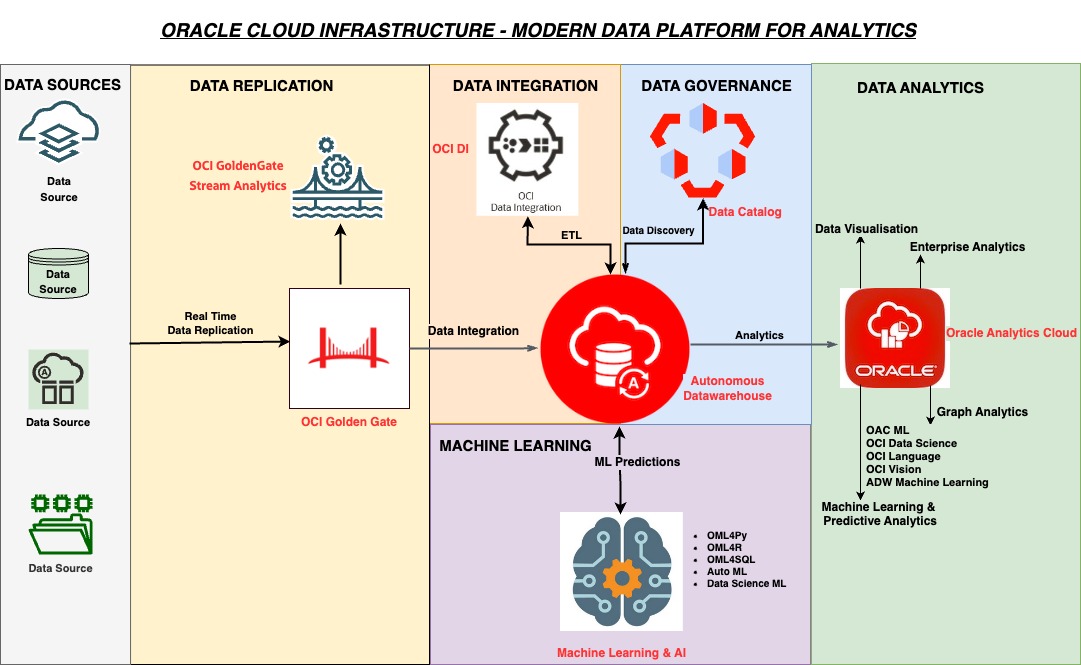Data is the real wealth of a business. With effective and efficient usage of data, business processes can be improved. It will help in finding potential customers, keeping track of existing customers, monitoring competitors, targeting advertising, and innovating. But just data collection isn’t enough. For it to be powerful, data must be analysed and then strategically applied. To accomplish this, a complete and effective analytics solution is required.
To implement a complete enterprise-level analytics solution, various data processing stages are required, e.g., data replication,data integration, ETL, data governance, machine learning predictions, and data analytics. Oracle cloud infrastructure (OCI) modern data platform, has extensive capability to fulfil this requirement. This blog is about how to leverage the OCI modern data platform to implement an enterprise analytics solution. It helps customers who need enterprise reporting and analytics to know about the many processes and products they can use to source, store, move, and manage data that they’ll use in OAC, including getting their data into Oracle Autonomous Data Warehouse. Moreover, this blog helps customers see that Oracle has an entire range of products as part of the OCI modern data platform to implement a complete end-to-end analytics solution.

Depending on your requirements, there could be the following stages of an end-to-end analytics solution, and this is how the OCI modern data platform will cater to the requirements of each stage.
Data Sources
Data sources are the origins of the data that is required to be analysed for analytics. They can be internal or external, structured or unstructured, and vary in quality, volume, and format. Data sources could be databases, files, cloud or on-premise applications, social media, sensors, etc. Depending on your analytics use cases, you may need multiple data sources to get a comprehensive and holistic view of KPIs. Integrating multiple data sources expands data coverage and scope and enriches data with additional information and perspectives that can uncover new patterns, trends, and insights.
Data Replication
For an enterprise analytics solution, organisations need to move data from multiple isolated systems to a common data warehouse for consolidated reporting and analytics purposes, and this is where data replication helps. The data replication process ensures fast, reliable data movement from numerous sources into a data warehouse to support near-real-time data analytics.
OCI GoldenGate for Data Replication
OCI GoldenGate is a managed service for cloud customers to provide a real-time data mesh platform that uses replication to keep data highly available and enables real-time analysis. Customers can design, execute, and monitor their data replication and stream data processing solutions.
OCI GoldenGate captures and delivers real-time changed data to data warehouses, lakes and object stores, reporting systems, and other online transaction processing (OLTP) databases with minimal source system impact. It provides real-time capture and delivery of changed data between OLTP and data warehouse systems. It is certified to capture from and deliver to Oracle Exadata, Oracle Autonomous Database (ADW, ATP, JSON), and Oracle Cloud@Customer platforms to enable real-time data warehousing or data consolidation solutions.
So OCI GoldenGate could replicate the data from various data sources and load it into a staging area of Oracle Autonmous Datawarehouse, which would be the input data for the data integration process.
OCI GoldenGate Stream Analytics
If there is a requirement to do real-time analytics, then GoldenGate Stream Analytics is the product that can be natively integrated with Oracle GoldenGate to acquire data and produce timely and accurate insights for businesses to make decisions. OCI GoldenGate Stream Analytics allows users to model, process, analyse, and act on real-time streaming information using sophisticated correlation patterns, time-series analytics, geospatial analysis, and machine learning.
To get more details on OCI GoldenGate Stream Analytics, please refer to these references.
OCI GoldenGate Product Home Page
OCI GoldenGate Documentations
Data Integration
Data integration is the process of combining data from multiple data sources into a single, cohesive view. It involves gathering data from various sources, cleaning and transforming the data to make it consistent and compatible, and then storing it in a central data warehouse.
OCI Data Integration service for Data Integration
OCI Data Integration is a fully managed, multi-tenant service that helps data engineers and developers with data movement and data loading tasks. Powered by ETL or ELT processes, a large volume of data can be ingested from a variety of data assets, cleansed, transformed, and reshaped, and efficiently loaded into Oracle Cloud Infrastructure target data assets.
OCI Data Integration picks the replicated data from Oracle autonmous datawarehouse staging schemas, intergrates it, transforms it, and loads it into the star/snowflake model of the datawarehouse.
To get more details on OCI Data Integration, please refer to these references.
OCI Data Integration Product Home Page
OCI Data Integration Documentation
Data Governance
Data governance is a process that involves how data is to be properly managed, accessed, and used. It refers to the overall management of the availability, usability, integrity, and security of data used in an enterprise. Although data governance is not part of analytics, these days many organisations want to do this management on their central data repository or data warehouse.
OCI Data Catalog for Data Governance
OCI Data Catalog is a fully managed, self-service, data discovery and governance solution for your enterprise data. With Data Catalog, you get a single collaborative environment to manage technical, business, and operational metadata.
Data Catalog is a metadata management service that helps data consumers discover data and improve governance in the Oracle ecosystem. With OCI Data Catalog, data analysts, data scientists, data engineers, and data stewards have a single self-service environment to discover the data that is available in the cloud sources. Data Catalog helps data providers create a data dictionary comprising of technical and business metadata. Data consumers can easily assess the suitability of data for analytics and data science projects.
Data catalog could use an datawarehouse as data source, harvest technical metadata, create enterprise vocabularies, and perform other data governance activities based on your requirements.
To get more details on OCI Data Catalog, please refer to these references.
OCI Data Catalog Product Home Page
OCI Data Catalog Documentation
AI & Machine learning
Predictive analytics is one of the most widely used flavours of analytics. Nowadays, most customers want to leverage machine learning (ML) techniques to identify the likelihood of future outcomes based on historical data. To predict future KPIs, appropriate machine learning models need to be developed and used for predictive analytics. In the OCI modern data platform, machine learning models can be developed in the Oracle Analytics cloud, Autonmous Datawarehouse, or OCI Data Science.
Autonomous Data Warehouse for Machine Learning
Oracle autonomous data warehouse machine Learning enables you to solve key enterprise business problems and accelerates the development and deployment of data science and machine learning-based solutions using scalable, automated, and secure machine learning for model building, evaluation, and deployment. In database machine learning has various components that you can leverage to train a machine learning model for e.g., OML4PY( ML using Python), OML4R(ML using R),OML4SQL(ML using SQL), Data Miner(GUI SQL Developer Plugin), or OML AutoML User Interface( AutoML using GUI Interface).
To get more details on Oracle autonomous data warehouse, please refer to these references.
Oracle Autonomous Datawarehouse Machine Learning Product Home Page
Oracle Autonomous Database Machine Learning
Oracle Analytics Cloud for Machine Learning
An Oracle Analytics cloud has predictive models that apply a specific algorithm to a dataset to predict values, predict classes, or identify groups in the data. In Oracle Analytics Cloud, you can use a GUI-based data flow editor to first train a model on a training dataset. After the predictive model has been trained, you apply it to the datasets that you want to predict. Oracle Analytics Cloud provides algorithms for any of your machine learning modelling needs: numeric prediction, multi-classifier, binary classifier, and clustering.
To get more details on the Oracle Analytics cloud for machine learning, please refer to these references.
Oracle Analytics Cloud Machine Learning
OCI Data Science for Machine Learning
OCI Data Science is a fully managed platform for teams of data scientists to build, train, deploy, and manage machine learning models using Python and open source tools. Use a JupyterLab-based environment to experiment and develop models. Scale-up model training with NVIDIA GPUs and distributed training. Take models into production and keep them healthy with MLOps capabilities, such as automated pipelines, model deployments, and model monitoring.
To get more details on OCI Data Science, please refer to these references.
OCI Data Science Product Home Page
OCI Data Science Documentation
Data Warehouse
A data warehouse is a central data repository where the data integration process loads and cleans data to be used further for analytics and reporting. A data warehouse centralises and consolidates large amounts of data from multiple sources. Its analytical capabilities allow organisations to derive valuable business insights from their data to improve decision-making. Over time, it builds a historical record that can be invaluable to data scientists and business analysts. Because of these capabilities, a data warehouse can be considered an organisation’s “single source of truth.”
Oracle Autonmous Data Warehouse
Oracle Autonomous Data Warehouse is the world’s first and only autonomous database optimized for analytic workloads, including data marts, data warehouses, data lakes, and data lakehouses. With Autonomous Data Warehouse, data scientists, business analysts, and nonexperts can rapidly, easily, and cost-effectively discover business insights using data of any size and type. Built for the cloud and optimized using Oracle Exadata, Autonomous Data Warehouse benefits from faster performance and, lowers operational costs. There are various deploymnet options available for Oracle Autonomous datwarehouse such as Oracle Autonomous Data Warehouse Serverless, Oracle Autonomous Data Warehouse on Dedicated Infrastructure, Oracle Autonomous Data Warehouse on Exadata Cloud@Customer, Oracle Autonomous Data Warehouse Bring Your Own License etc.
To get more details on Oracle Autonomous Data Warehouse, please refer to these references.
Oracle Autonomous Data Warehouse Product Home Page
Oracle Autonomous Data Warehouse Documentation
Data Analytics
Data analytics is the process of analysing data and producing meaningful, actionable insights, which are then used to inform and drive smart business decisions. Data insights can be produced in various forms, such as enterprise reporting, self-service data visualisation, etc.
Oracle Analytics Cloud for Data Analytics
Oracle Analytics Cloud combines existing and new services to deliver the industry’s most comprehensive analytics in the cloud. This delivers industry-standard capabilities as well as new ways to capitalise on your organisation’s collective intelligence. It provides everything you need for analytic agility, from fast, fluid self-service discovery to simple-yet-sophisticated data loading and blending, powerful inline data prep, data enrichment, automatic visualisations, data storytelling, instant mobile with full authoring, easy and extensible advanced analytics, and more.
The core capabilities of Oracle Analytics Cloud are:
- Self-service data visualisation, approach to enabling users to create stunning visuals to explain their results and share them with colleagues.
- Enterprise reporting, governance, and security, with a semantic layer that maps complex data into familiar business terms and offers a consolidated view of data across the organisation.
- Predictive analytics involves leveraging OAC predictive machine learning models, in-database machine learning models, and OCI data science machine learning models.
- Data preparation and enrichment are built into the analytics cloud platform.
- Business scenario modelling is an industry-leading modelling engine for self-service, multidimensional, and visual analyses.
- Proactive mobile that learns your routine and delivers contextual insights at the right time and location in your daily activities while on the go.
- Graph analytics by leveraging the Oracle database property graph feature.
To get more details on Oracle Analytics Cloud, please refer to these references.
Oracle Analytics Platform Product Homepage
Oracle Analytics Cloud Documentation
Want to know more about OCI Modern Data Platform and Oracle Analytics Cloud
To explore more about the OCI Modern Data Platform and Oracle Analytics Cloud, please refer to these resources.
OCI GoldenGate Product Home Page
OCI Data Integration Product Home Page
OCI Data Catalog Product Home Page
Oracle Autonomous Data Warehouse Product Home Page
Oracle Analytics Platform Product Homepage
Oracle Autonomous Datawarehouse Machine Learning Product Home Page
